Media | Articles
Don’t mistake Verstappen’s intensity for ego
In the closing laps of last Sunday’s F1 Brazilian Grand Prix, drama between Red Bull teammates stole the show, sending the internet into a tizzy.
In case you missed it, Max Verstappen held sixth position with less than a lap remaining, one spot ahead of Red Bull teammate Sergio “Checo” Perez. Verstappen, who clinched the driver’s championship over a month ago, was asked to surrender his position to Perez before the two crossed the finish line. An additional spot for Perez would be a welcome boon in points, as the Mexican driver was—and still is—locked in an intense battle for second place in the driver’s championship standings.
Verstappen refused.
“I told you already last time, you guys don’t ask that question,” he said over the team radio. “Are we clear about that? I gave my reasons and I stand by it.” As soon as Verstappen finished his transmission, the F1 world chimed in. Twitter feeds swelled with comments that labeled the young champ as “classless” and “spoiled.”
Wow …ok I guess there is a “I” on a team right there. Just wow
— Tony Kanaan (@TonyKanaan) November 13, 2022
Marketplace
Buy and sell classics with confidence
Red Bull held an emergency team meeting following Verstappen’s defiance. When the two-time champ emerged, he vowed to help his teammate in Abu Dhabi. Will it be too little, too late? Time will tell; remember that revenge is a dish best served cold.
The real question is: Was Verstappen justified in his refusal to move over, or should he have surrendered the spot?
Regardless of the discipline, team orders in auto racing have a long and complex history. In North American motorsports, explicit team orders are frowned upon, even penalized, by certain sanctioning bodies. Earlier this year, NASCAR team Stewart-Haas incurred a point penalty and fine when one of its cars slowed to block rivals so that the other Stewart-Haas could squeak by.
Formula 1, on the other hand, has adopted the team order tactic since the sport’s early days. In 1955, Mercedes asked Juan Manuel Fangio to let teammate Stirling Moss win in a grand prix in the Englishman’s homeland. Lorenzo Bandini surrendered his position to fellow Ferrari driver John Surtees so that he could notch enough points for the 1964 championship. In 1982—you get the idea.
Most examples of this … strategic collaboration weren’t as accepted as they are today. “I came up watching F1 in the Prost-Senna era, when most considered team orders to go against the intent of the sport,” says Hagerty editor Eddy Eckart. “You either had position on merit or you didn’t, and to slow down in a motor race was the antithesis of the activity itself.”
In the following decade, team orders became common practice. So much so that by the late 1990s, in the throes of Michael Schumacher’s dominance, it was speculated that Eddie Irvine served as Schumacher’s roadblock. Teammate choreography and tactics were morphing into blatant, convoluted exercises to achieve track position or maximize points, feints which sullied the sport’s image.
By 2002, the FIA outlawed team orders.
The ban didn’t last long. Less than a decade, in fact. Ahead of the 2011 season, the FIA deleted article 39.1, which prohibited team orders. Nearly every year since then, team collusion has reared its head in at least one grand prix.
You can’t fault the teams. Modern F1 racing seems to enable the orders. Competitors are constantly searching for the extra edge, that final thousandth. In an era of two-car operations, complex pit strategy, and a high degree of passing difficulty, support from a teammate is just another way to get ahead.
Orders have become increasingly transparent. Think of Valtteri Bottas playing a support role to teammate Lewis Hamilton’s multiple championships with Mercedes, or of last year’s season finale in Abu Dhabi, in which Perez held up title contender Hamilton to help Verstappen secure his first championship. Verstappen applauded his teammate, calling him a “legend” for delaying Hamilton. To borrow a line from the two most dynamic teammates Ricky Bobby and Cal Naughton Jr, in 2019 it appeared the teammates went together like “cocaine and waffles.”
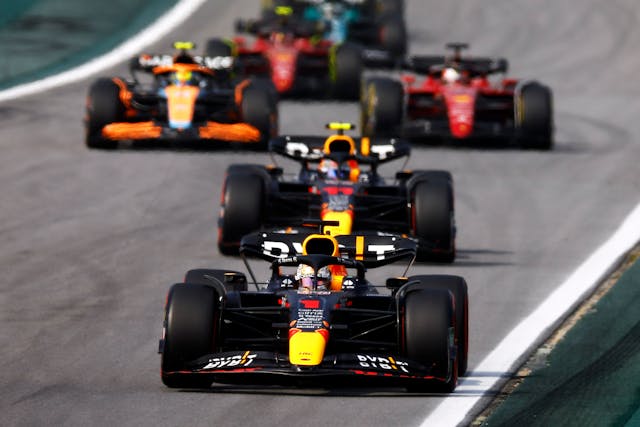
Last weekend, we witnessed a lack of reciprocation from Verstappen. This is what got F1 fanbase so steamed.
“Eddie Irvine once said being Michael Schumacher’s teammate was like being hit in the head with a cricket bat every other weekend,”says F1 reporter and Hagerty contributor James Foxall. “If you’re the number one driver, giving someone that kind of bruising treatment at every race, you have to give something back. Schumacher settled up when he gifted Irvine the 1999 Malaysian GP.”
“[Brazil] was a chance for Max to give something back,” says Foxall. “And the crazy thing is, it was for sixth place, which on the Red Bull scale of success might as well have been 16th.”
The next time Perez is asked to help his teammate, he may think twice.
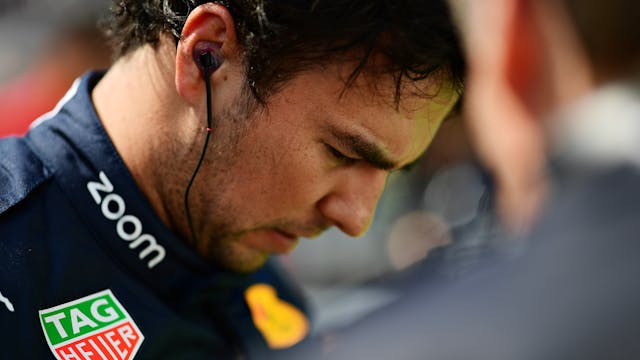
Still, Verstappen isn’t in the wrong.
Fans adore the incredibly talented Dutch driver because he is unapologetically brash, not because he is generous or poised. Just a few minutes before the Perez kerfuffle, Verstappen refused to back out of an overtake on Lewis Hamilton, causing a collision between the two drivers. Verstappen received a five-second time penalty for his aggressive move.
Rather than apologize, Verstappen looked Sky Sports in the eye.
“To be honest, I went around the outside and immediately felt he wasn’t going to leave space, so I just went for it. He didn’t leave me space so I knew we were going to get together. It cost him the race win and it gave me five seconds. It wouldn’t have mattered anything for my race.”
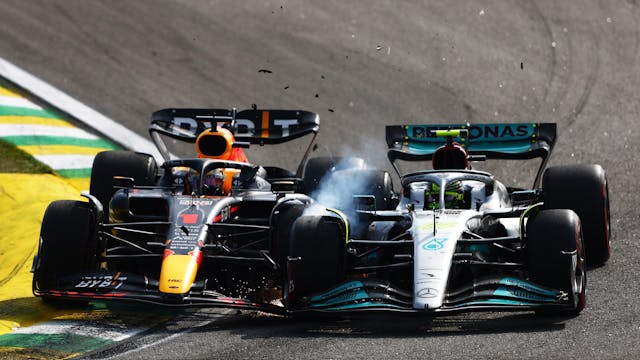
As bull-headed they are, that move and the incident with Perez are true to Verstappen’s character. There’s something to be said for being genuine, especially in an era in which you get the feeling that drivers are reading interview responses off cue cards.
Most of the men on the grid seem to be some combination of handsome, politically correct, and bland. Verstappen is, as Eckart says, “cut from a different cloth.”
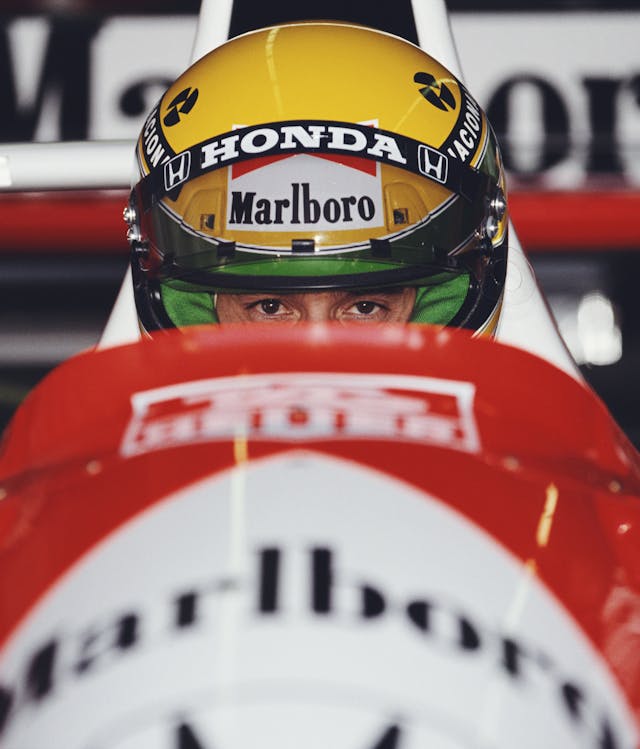
Verstappen’s refusal to relinquish a six-place spot underscores the ardent driver’s ruthlessness. Without it, Verstappen likely wouldn’t have had a full season of F1 competition under his belt before he turned 18. He is unrelenting in his pursuit of perfection, a throwback to other hot-blooded legends like Senna and James Hunt. (Go ahead and google “Hunt the Shunt.”)
Intensity is mistaken for selfishness by a new and young F1 fan base. The exponential growth in F1 viewership is well-documented, and it’s reasonable to assume that many of the fans questioning Verstappen’s character haven’t witnessed this type of ferocity. They may be too young or too new to the sport to remember the questionable—yet necessary—moves that won Schumacher seven world titles.
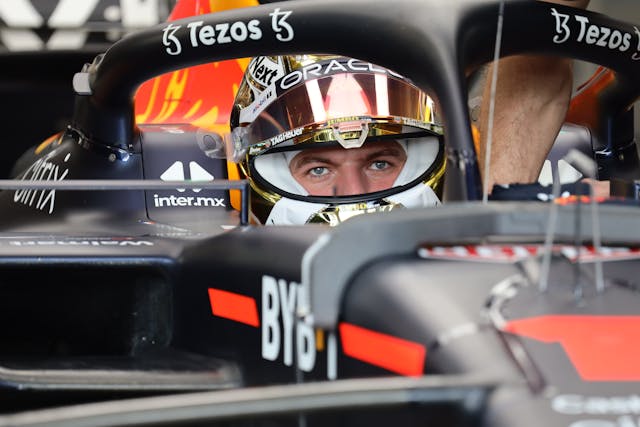
In addition, those that arrived since Drive to Survive may assume team orders are as mandatory as taxes. They are unfamiliar with the sport’s salad days, when it was all take and no give.
Veteran fans of the sport may recall a counterpoint to the no-holds-barred attitude of early 1990s F1, the moment when Senna let teammate Gerhard Berger through to win his first grand prix in 1991. First, let’s point out that this was one blip in the career of a driver who, on the track, took no prisoners. Second, Senna was 31 years old, a veteran who could see the forest through the trees. Verstappen is 25.
Asking Verstappen to backpedal in Sunday’s final lap was a foolish request in the first place. Red Bull should never try to tame the feral genius that hunted down two successive championships and dropped them at its door.

Check out the Hagerty Media homepage so you don’t miss a single story, or better yet, bookmark it. Motorsports what you crave? Head to Imola, Hagerty’s HQ for all things racing.
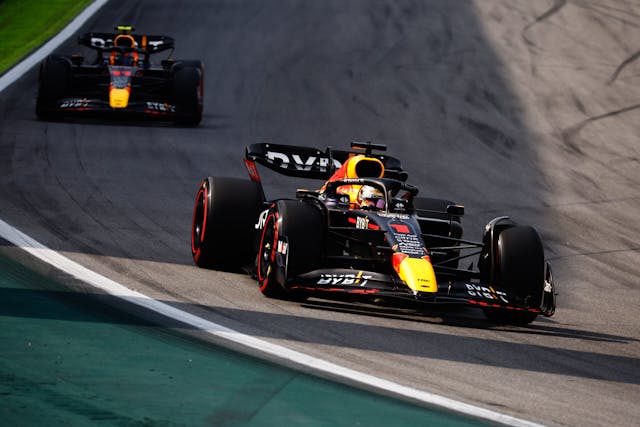








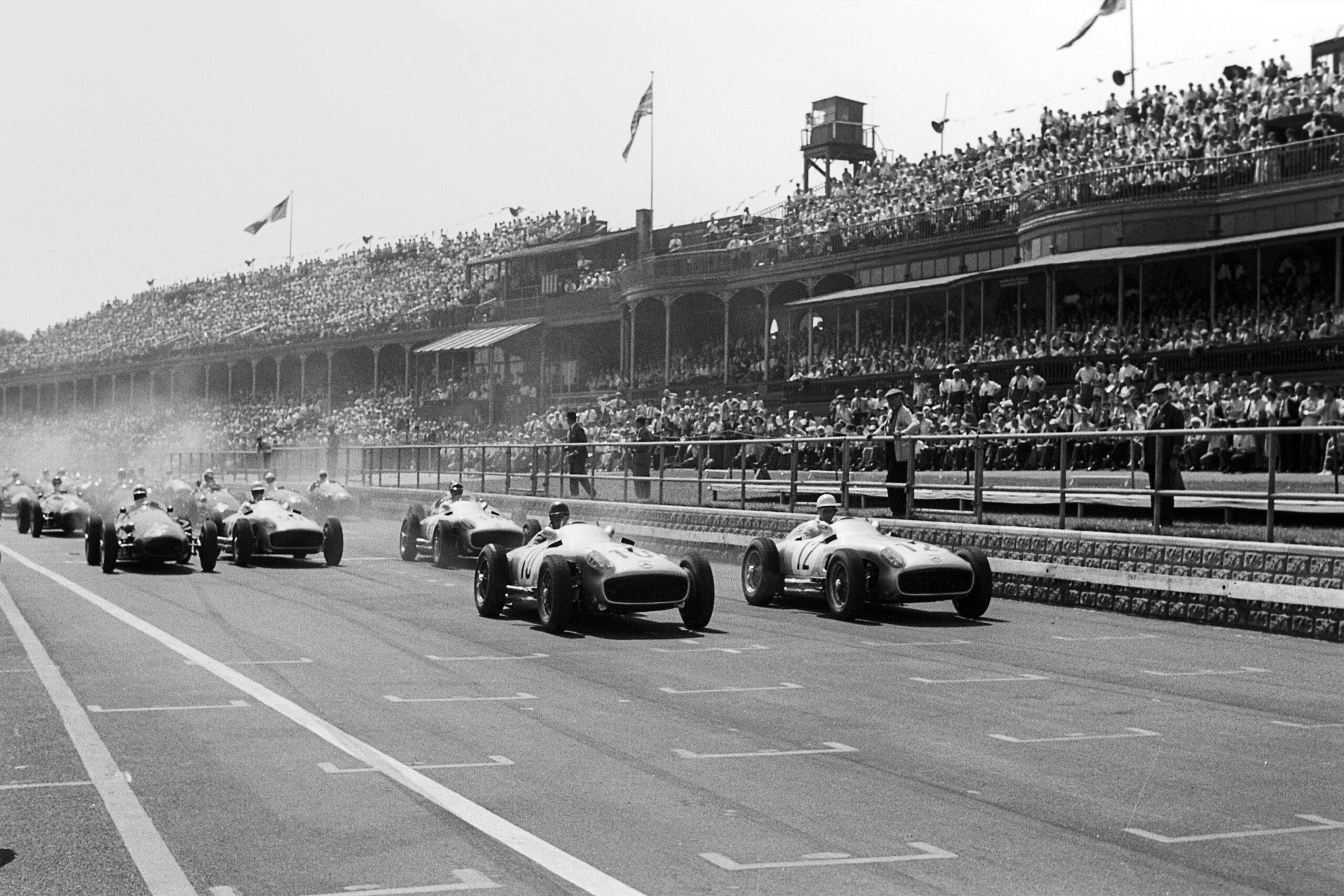
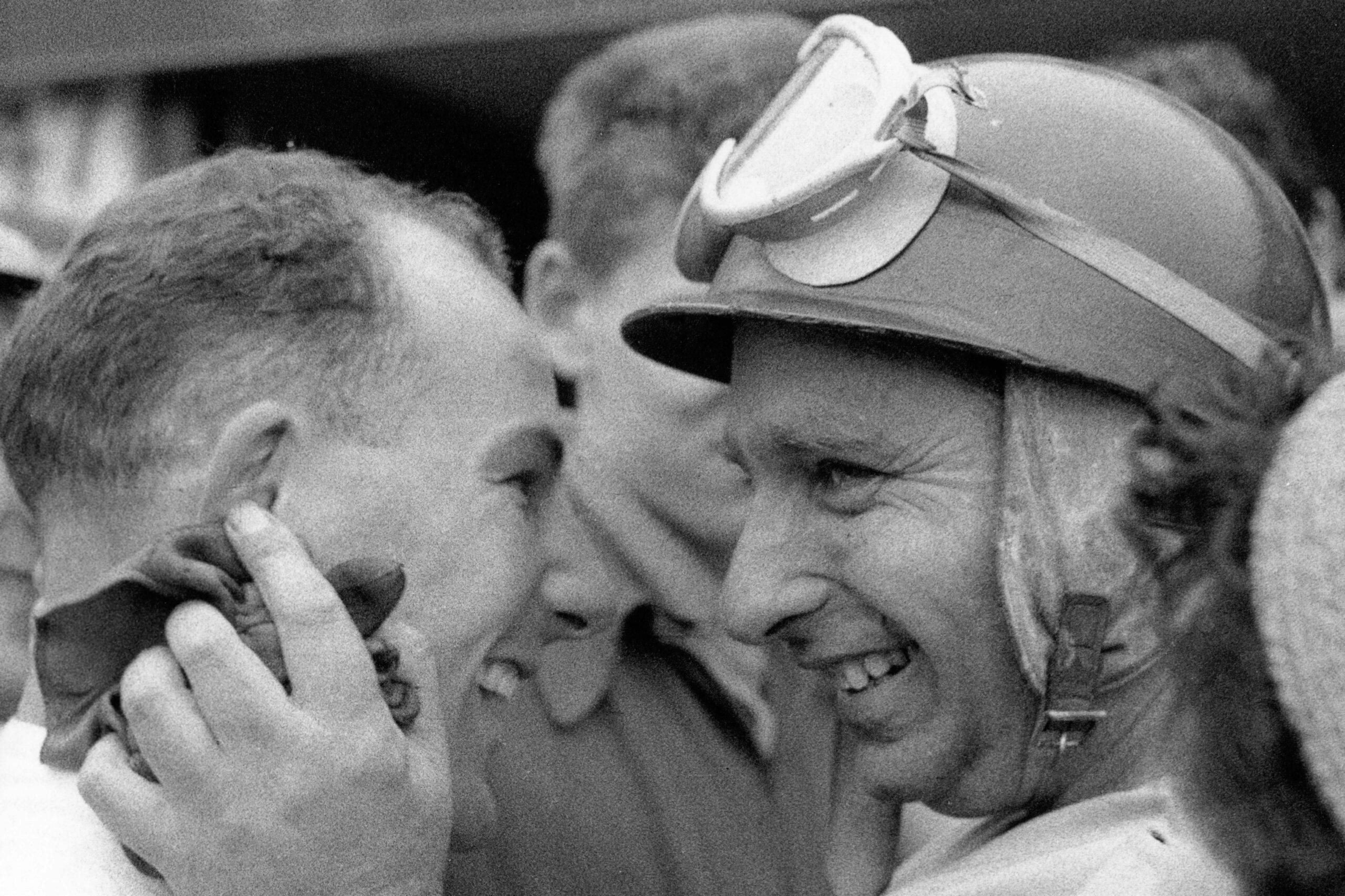










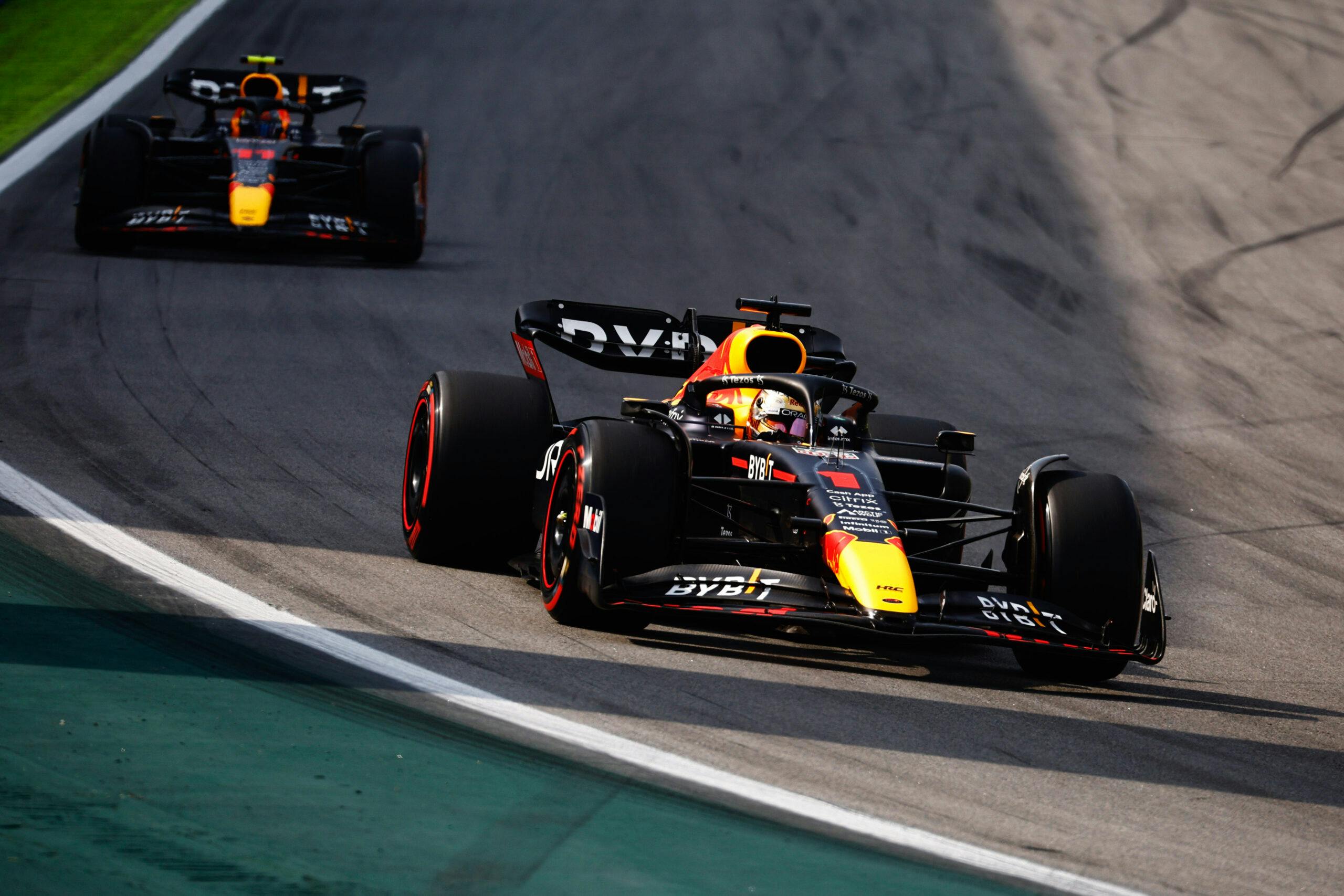
Max is just your basic “Egomaniac”! When it helps him, he is a true team player, when it doesn’t, you know how it goes!
What a crock! Max is and has always been a selfish brat— willing to destroy his own race in order to spoil others’ races.
…says Hagerty editor Eddy Eckart. “You either had position on merit or you didn’t, and to slow down in a motor race was the antithesis of the activity itself.”
That’s correct from my viewpoint. Otherwise what’s the point of being involved as a driver?
Drive to win for the entire race. Every Race. Period.
F1 is a combination of team and individual sport–it’s built right into the championships–so this will always be a tricky balance to manage. I personally prefer team competition that betters the team not at the expense of the individual. Last year, Perez did his best driving to fend off Hamilton for Verstappen. That was good teamwork. Slowing down to let a teammate pass is demeaning of the competition. A race won because another driver courteously let you pass is no victory, except on paper. It’s a subtle distinction in this case, but an important one. Like I said, this will never be a simple one-size-fits-all answer.
Yes, Max is genuine. A genuine asshole.
It’s not intensity, it’s being a selfish prick.
OK, now that I’m done laughing at “cocaine and waffles”…
Max was brought up toughly by his Dad Jos according to several accounts, and is arguably more mentally tough & uncompromising than Lewis Hamilton; note where Max puts his car on numerous occasions…
Team orders are a long-held tradition in F1, maybe more so with the millions of dollars at stake and the win-at-any-cost mentality that’s a side effect of stiff competition to even get a seat, let alone the rest of it. The “social graces” tend to be tossed in such an environment, and Max arguably doesn’t appear to have them in great abundance to begin with. While I personally place these team orders in low esteem, it’s not a perfect world anywhere; and in a series as hyper-competitive as F1, it’s going to happen. Remember “Fernando is faster than you”?
It’s ego.
How kind of you to ascribe Max’s brainless narcissism to intensity and the callowness of youth. You are wrong on so many levels. Here are a couple: you left out that earlier in the race, Sergio was ahead of Max but was asked by the team to allow Max to pass so he could chase down the Ferrari and Mercedes. He couldn’t — the Mercs were too fast — so the request was simply to return to the previous order. In spite of publicists’ and lazy media’s attempt to portray it as a mano a mano duel, F1 is a team sport. There are 500 other people doing everything in their power to build the fastest car and win races. The pilotes are simply the spearhead, and whiny prima donnas at that; just listen to the radio transmissions. Max (although he is not alone), as well as quarterbacks and the like suffer from what Keith Richards calls “Lead Singer Syndrome”, where they think they ARE the team (or the band). Red Bull is attempting to do what they’ve never done before: win the Constructor’s Championship AND have their drivers finish in first and second place. Max is not contributing. You don’t have to be married to know if you can do someone a favour and it costs you nothing, you do it. That goes double for debt repayment. Sergio has played the loyal domestique all season. I do not want to see the poisonous enmity between teammates that has all too often been the case in F1 teams, even if it can be used to gin up casual-fan interest. I’m sure Christian Horner doesn’t either. Red Bull will be weakened next year if everyone isn’t pulling in the same direction; Mercedes, Ferrari et al. are waiting. Sergio is quick enough in his own right. Karma can be a bitch.
There is nothing good to be said for “being genuine” when doing so is selfish, arrogant and dangerous. It’s like a person being admired for “speaking their mind” forgetting that what came out of said person’s mouth was deliberately hurtful or outright lies.
Max has the championship in hand. There was zero reason for him to push things with Hamilton or not let Perez by. Sooner or later his behavior is going to get him hurt or worse. Perhaps then he’ll stop to consider his actions? Perhaps then it will be too late…
Max may be the current winner of this seasons F1 championship, but he will never be a champion in my book. His aggressive driving style, that puts others at risk, his constant whining and casting blame on other drivers so often heard over race radio, and his complete arrogance against the team sponsors and owners who pay him and put him in the seat are pretty plain examples of his complete lack of respect for the sport. Perez was right in saying we all now know where Max stands.
Yeah, I gotta disrespectfully disagree (I learned that position from watching Verstappen.) I’ve watched every single F1 GP since 1991 (and have been following it since ’83), and Max is different than most every other driver. His moves are mostly impetuous, because he feels like he’s “entitled” to win. Just watch him week in and week out. Is he a good driver? Absolutely! However, just like the move on Hamilton at Brazil, rather than driving cleanly and respectfully (which Hamilton has largely done – and, by the way, I’m NO Hamilton fan), he risked both of their races because he felt entitled to do it…..plus, it was Hamilton’s fault anyway, right. Just watch the last two races of the 2021 season, and you will learn all you need to learn about MV. Race wins are HIS, and if the can’t get them, he’d just as soon burn it to the ground!
“Intensity is mistaken for selfishness by a new and young F1 fan base.” That’s a pathetic excuse, and flat out wrong. I’ve been watching F1 for 30 years. Intensity is one thing and it’s clearly necessary for success. What Max did was the definition of selfishness at its most pure. As Perez said on the radio, it shows who Max really is.
It’s disappointing that people are talking about this instead of the stewards reimagining the rules to avoid penalizing Hamilton for causing the contact at turn two.
Hundred %
I can’t say I love the current crop of F1 racing. It is kind of boring. I think every driver needs to do their best and not hold back every race.
Go Max! You won’t get many 2nd chances to do what you are doing right now. I have heard it is better to be feared than loved, especially in your sport!. Your competition will take full advantage of any hint of a weakness. And “boo-hoo” for Checo. He is a great driver and has been around the track enough times to know exactly what is going on. On to the next race!
P.S.- There is a reason why there are #1 and #2 drivers.